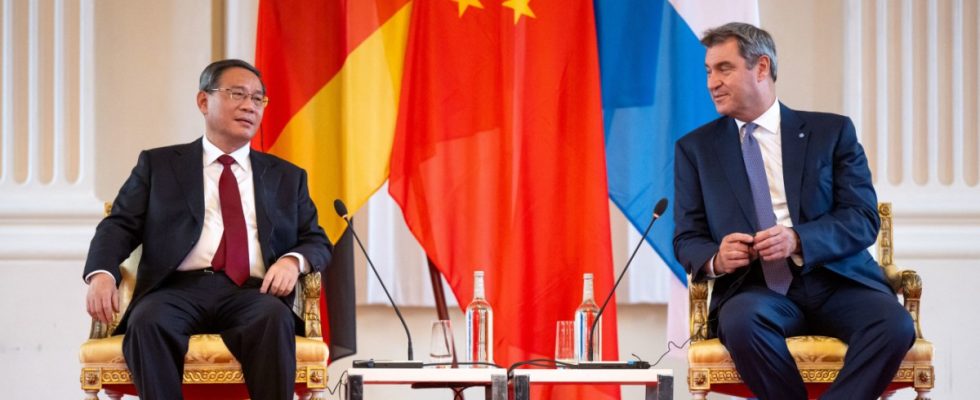The things that Markus Söder likes include animals and photos, and the things that he likes very much include, unsurprisingly, photos that show him with animals. In this respect, everything is coming together perfectly for the Bavarian Prime Minister when he sets off on a six-day delegation trip to China on Saturday evening.
The first stop from Sunday to Tuesday is Chengdu, the capital of Sichuan Province, the newest of the Free State’s three Chinese partner regions (after Shandong and Guangdong). Chengdu, a booming city with twenty million inhabitants, is firstly considered extremely fertile ground for German companies – and secondly as a global center for panda breeding. It’s hard to imagine that Söder would miss out on checking out the panda research station with its forty furry residents.
Formally even more important, however, is a meeting that is planned at the end of the trip on Wednesday: Söder will be received in Beijing by Chinese Prime Minister Li Qiang, the second man in the state behind President Xi Jinping. Söder said on Thursday that the fact that he received a “personal invitation” from the head of government was “very remarkable” and reflected the “importance” that Bavaria enjoys in China. Last summer, Söder welcomed Li Qiang to the Munich Residence – now the return visit is coming up. Söder is also expected to meet the Chinese trade minister in Beijing; On Thursday evening the rather small delegation lands back in Munich.
The CSU boss knows that his foray into international politics will not be met with enthusiasm everywhere, for example in the federal government. In 2023, the traffic light presented a China strategy in which the People’s Republic is defined more as an economic competitor and systemic rival than as a partner. “We are not naive at this point, we are very realistic,” said Söder. “We recognize the challenge that China poses.” In his view, Germany must protect its economic opportunities in China and “at the same time reduce dependencies.”
Under no circumstances were Bavarian activities directed “against the federal government”.
In any case, Söder has already expressed the Bavarian China strategy in the usual catchy formulation: “more real rather than moral politics”. Under no circumstances are the Bavarian activities directed “against the federal government,” but they do have “their own accent.” The state government wants to continue to be a “door opener” for Bavarian companies that need “any support,” said Söder. China is the Free State’s largest trading partner in the world. Nevertheless, in China he will “of course address all the things that need to be addressed”, but in contrast to “others” in a constructive tone: “It’s not about snubbing, but about staying in the conversation and achieving change through the conversation. “
Florian von Brunn, the SPD parliamentary group leader in the state parliament, made it clear on Thursday that the Bavarian “panda diplomacy” (Söder) does not convince all political competitors: “I expect Mr. Söder to address the massive human rights violations in China within the appropriate framework brought up and not politely ignored the dictator.” The human rights situation in China has deteriorated drastically since Xi Jinping took office in 2013. The CSU then said that Brunn’s party colleague, Chancellor Olaf Scholz, was also maintaining pragmatic contact with Beijing and wanted to travel there himself in April.
But first the stage belongs to Söder, who visited China several times before becoming prime minister. He sees his journey as part of “a long tradition,” after all, in 1975, CSU leader Franz Josef Strauss was the first German politician to be granted an audience by Chinese President Mao Zedong. Since then, the CSU Prime Ministers Edmund Stoiber and Horst Seehofer have also gone on trips to China. However, Söder’s predecessors negligently failed to illustrate their diplomatic efforts with panda photos.

